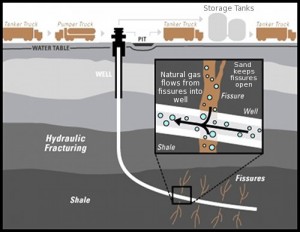 |
| ![]() Tweet As Paul Krugman points out, in the NY Times, “fracking” for hydrocarbons, , see pictures at left, would, in fact, be highly subsidized:
Tweet As Paul Krugman points out, in the NY Times, “fracking” for hydrocarbons, , see pictures at left, would, in fact, be highly subsidized:
Fracking — injecting high-pressure fluid into rocks deep underground, inducing the release of fossil fuels — is an impressive technology. But it’s also a technology that imposes large costs on the public. We know that it produces toxic (and radioactive) wastewater that contaminates drinking water; there is reason to suspect, despite industry denials, that it also contaminates groundwater; and the heavy trucking required for fracking inflicts major damage on roads.
Economics 101 tells us that an industry imposing large costs on third parties should be required to “internalize” those costs — that is, to pay for the damage it inflicts, treating that damage as a cost of production. Fracking might still be worth doing given those costs. But no industry should be held harmless from its impacts on the environment and the nation’s infrastructure.
Yet what the industry and its defenders demand is, of course, precisely that it be let off the hook for the damage it causes. Why? Because we need that energy! For example, the industry-backed organization energyfromshale.org declares that “there are only two sides in the debate: those who want our oil and natural resources developed in a safe and responsible way; and those who don’t want our oil and natural gas resources developed at all.”
So it’s worth pointing out that special treatment for fracking makes a mockery of free-market principles. Pro-fracking politicians claim to be against subsidies, yet letting an industry impose costs without paying compensation is in effect a huge subsidy. They say they oppose having the government “pick winners,” yet they demand special treatment for this industry precisely because they claim it will be a winner.
“Here Comes The Sun,” by Paul Krugman, on NYTimes.com, dated November 7th 2011.
Mr. Krugman also notes that, with respect to solar energy, there’s good news:
… [T]he price of solar panels is dropping fast…. In fact, progress in solar panels has been so dramatic and sustained that, as a blog post at Scientific American put it, “there’s now frequent talk of a ‘Moore’s law’ in solar energy,” with prices adjusted for inflation falling around 7 percent a year.
This has already led to rapid growth in solar installations, but even more change may be just around the corner. If the downward trend continues — and if anything it seems to be accelerating — we’re just a few years from the point at which electricity from solar panels becomes cheaper than electricity generated by burning coal.
And if we priced coal-fired power right, taking into account the huge health and other costs it imposes, it’s likely that we would already have passed that tipping point.
But will our political system delay the energy transformation now within reach?